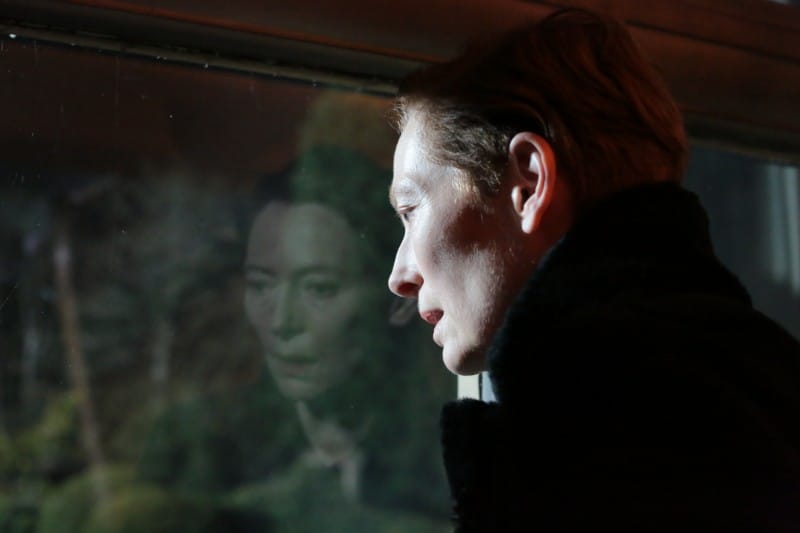
British director Joanna Hogg and actor Tilda Swinton have known one another for a long time. Swinton appeared in Hogg’s 1986 short film Caprice, the director’s final project at England’s National Film and Television School. Swinton and her daughter, Honor Swinton Byrne, both starred in Hogg’s deservedly celebrated The Souvenir (2019) and its 2021 sequel. The years of collaboration between the two, however, have reached a new peak with The Eternal Daughter, a mystery set at an exceptionally eerie and foggy hotel in Wales.
Swinton gives two performances in the film. We see her first as Rosalind, an elderly woman traveling to the hotel with her daughter, Julie, also Swinton. If those names sound familiar, that is because they are the names of Honor and Tilda’s mother-daughter characters in The Souvenir films. Appropriately, those films haunt this one, a gothic tale in the tradition of the so-called “woman’s films” of Classical Hollywood and featuring a ghost story in the spirit of Scooby-Doo. (What higher compliment can there be than that?)
With a long drive up a remote, foggy road and a fitting tune on the flute in accompaniment, the film’s opening sets an immediate tone and atmosphere that will be carried throughout. Hogg manages to capture that very specific blend of cozy and creepy. The kind that brings about the urge to tuck oneself into a blanket so that only one’s eyes are revealed. It is a duality not unlike the one Swinton’s Julie experiences in the film. The Wales hotel at which they stay used to be their family home. Rosalind shares stories of growing up there, hearing the nearby bombs in Liverpool during the Second World War. And thus, for Julie, the trip carries with it many positive associations. She relishes spending time with her mother and learning more about her past. But when she walks the grounds, particularly at night, sounds, winds, and feelings haunt her mind.
Much of the film plays like a dream. Julie and Rosalind seem to be the only guests at the hotel. The clerk at the front desk (Carly-Sophia Davies), who also works as a waitress at the hotel’s restaurant, treats them with a consistent, unearned rudeness. Such moments provide comedic relief to an otherwise serious film but leave the viewer even more disconcerted. Something is afoot, but we do not know what. There is a mystery to be solved, but what that mystery is, we do not know until it is over.
In her two performances, Swinton manages to deliver the painful nuances of the mother-daughter relationship. Julie carries with her a kind of guilt. She tries her best to care for her mother. But she also wants to coax stories of the past from her for a film she is working on. At times, she records her reluctant mother without her consent. Hogg and Swinton depict the kind of relationship that is loving but not always intimate. The kind that reveals how we can be close to someone without fully knowing them. When we see Julie and Rosalind in conversation, Hogg shoots them mostly in shot/reverse shot. A decision presumably born, in part, out of ease for shooting a single actor carries with it the effect of exacerbating this feeling. Of showing how while they may be physically close, an emotional chasm exists.
Following in the tradition of many great gothic films, like Rebecca (1940), for example, The Eternal Daughter understands the ways in which homes can act as sponges, soaking up the emotions and the memories of those who lived there, even when they have gone. After Julie triggers a sad memory of Rosalind’s, mother comforts daughter by reminding her, “That’s what rooms do. They hold these stories.” Later, Julie forms a friendly relationship with the night manager at the hotel, Bill (Joseph Mydell), who talks about his deceased wife. Both bond over memories of their families and their shared isolation.
The conversation between Bill and Julie deals with the nature of memory. Bill shares stories of walking the grounds, where memories of his deceased wife come back into his mind. Their exchange comes to mirror much of the film’s emphasis on the physical spaces of the building. Dialogue-heavy scenes are bookended with long shots of hallways, sometimes with Julie hurrying down them and other times just empty shots of the misty night. Memory is liquid. It travels. And it comes to us when we move about the world. When we are confronted with the ghosts, human or otherwise, of our past.
In the roles of Julie and Rosalind, Swinton captivates on every level. Hogg brings us close enough to see and hear nearly every word that comes out of her mouth and movement she makes. And yet we remain at just the right distance to maintain the mystery. The more we get to know her, the more disoriented we become. It is a virtuosic blend of performance and direction.
The Eternal Daughter is the kind of film that will only grow better with subsequent viewings. Its rewatchability is due in no small part to Hogg, who, with this film, shows once again why she is one of the finest directors working today. And, if she is not already there, nearing the zenith of her craft.
The Eternal Daughter debuts in theaters on December 2, 2022. Watch the film’s trailer here.
Related Topics: A24

